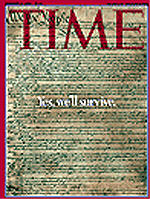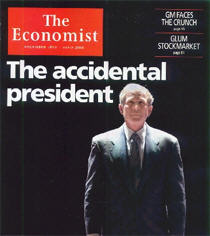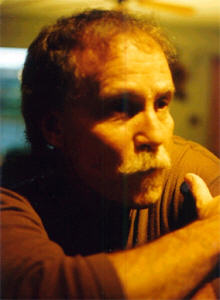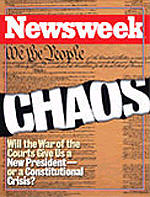 |


|
|
Preparing for the Revolution |
|
By Jack Nichols
“Are you the president? It is a trifle.”
…Walt Whitman, "The depravity of the business classes of our country is not less than has been supposed, but infinitely greater."
…Walt Whitman, “Let the school stand! mind not the cry of the teacher! Let the preacher preach in his pulpit! Let the lawyer plead in the court, and the judge expound the law. Comerado, I give you my hand! I give you my love more precious than money, I give you myself before preaching or law; Will you give me yourself? Will you come travel with me? Shall we stick by each other as long as we live?"
…Walt Whitman,
While others were expressing those electoral jitters, I'd been floating in a pool outside my Florida apartment, dreaming of a Utopia based on what I know of various noble traditions, especially that of America's Poet of Democracy, Walt Whitman. Though I've generally remained closety about my non-violent, communal-individualist political leanings, I see now that I'm not he only one. There are others too who are imagining a world without hypocritical supreme courts and who are willing to question the authority of a nation state that is run without conscience on what our greed-filled fascists call “the bottom line.” The dissolution of a nation-state is, in the public mind, associated with “chaos”, a singular word, incidentally, that has just appeared on the cover of Newsweek. TIME magazine's cover assures its worried readers—with a singular sentence-- that they will survive.
 Who TIME's survivors may be, however, is a question that begs a reply. Will they be the elderly
living on Social Security that George W. Bush hopes to link to uncertain stock markets? Will they be
people with AIDS hoping for a brighter future from a governor-politician who's never once mentioned the virus? Will they be gay men, lesbians, bisexuals and the transgendered whose very lives are in jeopardy under a Republican administration that cares not one whit if they are murdered?
Who TIME's survivors may be, however, is a question that begs a reply. Will they be the elderly
living on Social Security that George W. Bush hopes to link to uncertain stock markets? Will they be
people with AIDS hoping for a brighter future from a governor-politician who's never once mentioned the virus? Will they be gay men, lesbians, bisexuals and the transgendered whose very lives are in jeopardy under a Republican administration that cares not one whit if they are murdered?
Are you finally willing to consider acknowledging your own tendency to rebel against such an administration? If you think you deserve the right to expect that your vote counts, that you are entitled to express your own opinions, lend me your ear. The traditions I respect are based on an immutable principle: the independent investigation of truth. Unfortunately, too many people accept hand-me-downs and are willing to call them “truth.” They don't verify matters for themselves. They don't challenge established ideas. Most people, without realizing it, are pulled and pushed within narrow frameworks of respectability.
Shakespeare said, be true to yourself and you won't be able to be false to any man. This statement is a sure foundation stone in any sane worldview. Buddha, as he died, spoke these last words to his disciples: “Work out your own salvation with diligence.” This advice is quite different than any which depends on a bureaucratized fascist regime that lacks legitimacy. Walt Whitman wisely celebrated a kind of man or woman who learns to depend on self and yet recognizes the fact of interdependence. Whitman was often willing to cast doubts on academic cadres, believing that persons self-taught learn what they discover meaningfully. If public schools are arms of the state and private schools are arms for religious fanaticism, thoughtful people must then discover how to better self-educate. The philosopher—armed with skeptical insight, asks basic questions about the dependence of certain populations on religious creeds. What about trusting those who preach these creeds? Should not our own minds be our own churches? That was what the great revolutionary American Common Sense hero, Thomas Paine, suggested. Can we depend on a government creed? Do we trust the “elected” politicians who recite it? Should we not scorn all theories of institutionalized political authority? Let us demonstrate our politics in our personal behavior. Can we be sure all governmental laws are just? How about those of the multi-national corporation? Are not the especially privileged allowed favors? An essential personalized rule must emerge in all politics. It is a rule honored in name, at least, by every culture. It is known in Western culture as The Golden Rule. Do Unto Others as You Would Have Them Do Unto You. Our sense of justice should encompass all classes and peoples equally. A balanced person is not one who has been adjusted by custom to live within a sick social status quo. She or he is one who opens herself or himself to variety in others while holding fast to an individualist's selfhood. Can we trust the medical establishment to treat us fairly? Or has greed entered the picture? Will many of us die if we cannot afford medicines or medical treatments? It is time to establish self-monitoring stations where each person may learn to determine signs of health or sickness. Is it not high time that corporate polluting and medical profiteering deserve careful but rage-infused exposes? Oafs, Serfs and Vassals The Individualist who is, nevertheless, passionate about social harmony, is needed today more than ever before. In every age the Individualist and His or Her Companions return.
Already they've declared war on the world of nature. One species after another disappears, legally murdered by government-protected mass murderers, using cruel, inappropriate Technology. In our day a major nation-state refuses to halt the extermination of whales. In another, nation-state and multi-national corporation leaders make light of acid rain while they kill lakes, forests, birds, animals, fish. The largest and richest nation-states refuse to face up to global warming. The great powers risk total war for petroleum interests, fossil fuels that will soon make fossils of us all. Are you willing to die for oil barons? For a few cents at the pump? Will you watch as your family is incinerated for gasoline profits? Are you willing to be passive in the matter of your own survival? Will you let others dispose of you as they will? If you say “NO!”, then listen close. Peter Kropotkin, a man who spent long years in exile and in jail after renouncing the privileged lineage he had in pre-Soviet Russia, embodied liberty's tradition, as it grew in the 19th and early 20th centuries. He addressed the young: “I assume that you are about eighteen or twenty years of age, that you have finished your apprenticeship or your studies, that you are just entering on life. I take it for granted that you have a mind free from the superstition which your teachers have sought to force upon you: that you do not fear the devil, and that you do not go to hear parsons and ministers rant. More, that you are not one of the fops, sad products of a society in decay, who display their well-cut trousers and their monkey faces in the park, and who even at their early age have only an insatiable longing for pleasure at any price. “I assume on the contrary that you have a warm heart and for this reason I talk to you.” When the exiled Kropotkin was asked by famed scientists in Great Britain to join a royal geographic society, he replied, “I couldn't possibly join a royal society.” He was no less hostile to constitutionalists. He knew, as we in America are now discovering, that constitutions guarantee little or nothing to those who hold them sacred. All of us should know that nation-states are not eternal. Corporations dissolve as well. Governments eventually dissolve. All political documents are fallible. All corporate charters are subject to criticism. No political set-up enjoys the protection of God. Nation-states of the past have dissolved. What is to keep the nation-states and their supportive corporations today from going the way of Greece or Rome? The days of nationalism are numbered. Methods of the Nation State Nation-states have committed barbarisms, liquidations, inquisitions and slaughters. It is quite probable that ours is guilty too. The leaders of nation-states change. If a nation-state is founded by good men, there's no guarantee that other good men will rise up and fill their stead. The founding principles of a nation-state are always reinterpreted and forgotten. We must resist outside influences demanding too much of our lives. When interference comes from the nation-state or from other major institutions, the detested result is domination by bureaucrats and functionaries. Our thinking must clarify for us how such interference and domination occur.
 The state now takes money from every paycheck to finance its hair-brained
corporate-sponsored schemes. This greedy seizure of funds is called taxing.
Currently while an illegitimate president, installed by default, sits on the highest
seat in the land, his minions impose taxation without representation.
Tax money is generally spent foolishly by bureaucrats or with no intention
of using the collected booty for the general welfare.
The state now takes money from every paycheck to finance its hair-brained
corporate-sponsored schemes. This greedy seizure of funds is called taxing.
Currently while an illegitimate president, installed by default, sits on the highest
seat in the land, his minions impose taxation without representation.
Tax money is generally spent foolishly by bureaucrats or with no intention
of using the collected booty for the general welfare.
Those who tax us use the collections invariably say that there is a “need” for more and higher seizures. The revolutionaries of 1776 protested taxation without representation. Today's revolutionaries appreciate that it's impossible to be properly represented where the votes of the overtaxed are ignored and where the overtaxed are far removed from power centers (such as the politicized Supreme Court) run by small and dangerous cliques of ideologues, profiteers and fundamentalist madmen. The Constitution Citizen safety can't be guaranteed by allegiance to a constitution. Dangerous leaders bypass constitutions or use them toward their own twisted ends. A government official can shield himself behind the skirts of a constitution and in the meanwhile he engages in all manner of skullduggery. Citizens of a nation-state swear allegiance to its constitution, but most have never read the august document. The constitution is placed on a pedestal. Nine mysterious judges are appointed to interpret its inner significations. They wear black robes and sit ceremoniously in a Greek-like temple. They engage in hocus pocus. It is widely assumed that the constitution is a God-send. It is thought to have nearly miraculous powers, certainly to be beyond criticism. Few realize that its contents are full of compromises, political accidents and class assumptions current when it was haphazardly composed. Since government lives on the industry of others, it is in its interest to convince others that its services are indispensable. Government agents recoil in horror at the mention of such ideas. They call those who espouse them “anarchists” and “terrorists” doing whatever they can to associate them with chaos, disorder and carnage. They ignore noble traditions of critical,non-violent political thought. They do this because such thinking would deprive them of their meal ticket. Government officials enjoy status, honor, privilege and gain because it is mistakenly thought that without their “services” humanity would dissolve in chaos. Citizens ask, “How could we possibly exist without a government?” They fail to note that major governments in power may, through inaction on the environment and other such matters, bring about universal death. But without such a government, what would stand in the place of the nation-state? Only a vast networking of local area units, united worldwide by the Internet and other marvels of communication. National governments, along with other dangerous centralized abstractions must disintegrate before the one reality they'd prefer to ignore: the local community. The bland uniformity dictated by corporate-rich national governments must give way to the rich variety offered by the neighborhood, town, city or county associations. The State Police Statists assume the worst about people, that we need state watchdogs, state police. Without state police, they think, human beings will tear one another to pieces. But the grand non-violent political tradition on which these thoughts are based does not accept that human beings are inherently violent. It sees that they are far more likely to cooperate if not encouraged by their culture to contend and compete, opposing each other for scraps and spoils from the tables of the privileged few. Is there proof that state-supported police make for a crime free environment? Hardly. A more effective method for reducing crime involves a re-examination of cultural norms and the often twisted sex-role-generated values at the base of those norms. Changes in culture create crime-free environments. How do we know this? There are many locales in the world where murder and robbery are, by U.S. standards, nearly non-existent. In densely populated locales, such as Tokyo, where a peaceful populace agrees that handguns are properly illegal, there are approximately 40 muggings per year. In New York City, however, where police carry guns, there are approximately 11,000 muggings annually. The official homicide rate in Japan in 1988 was 1.2 murders per 100,000 people, while in the United States there were 8.4 murders per 100,000--over seven times higher. What makes the difference? Culture. One solution for dealing with crime is already in effect in many places. It has wrought startling changes. Those who use this solution rely not on state police but on themselves. They create The Neighborhood Watch. Even in locales where the dominant culture is permeated by violence, Neighborhood Watches prove local crime can be reduced. How many murders and other crimes are solved by the state police? The number is embarrassingly low. It is so low, in fact, that one must wonder if state police truly earn their keep. State police have always excelled in the “solving” of victimless crimes. Prostitution, pornography, nudity, gambling, and the ingestion or possession of state-controlled substances provide them with diversions. The War Threat The main excuse for preserving the nation-state is fear of attack by other nation-states, creating the so-called need for huge, unwieldy defense establishments. This fear is not “people to people” inspired. It is nation-state inspired. Cliques represented by one nation-state contend against cliques in another. The interests of the corporate-backed nation-state and its reasons for going to war against other states are determined by three ruling classes within each state. Since earliest times, as Edward Carpenter explains in The Healing of Nations, these three classes have dictated whether ordinary people live or die. They are the Religious, the Military, and the Commercial classes. Each of these three classes maneuvers to become the ruling class of each nation-state. Nation-states, as a result, become class governments. To advance an agenda, one or more of these three classes may foment war. While the Commercial class, morphing into huge corporations, acts to subordinate the welfare of citizens to its own gain, it often offers support to the Military, a class especially eager to increase its powers. Finally, the third class, the Religious, may see its interests coinciding with those of the other two classes and so there is loosed a mighty impetus for turf rivalry with other nation states. Unfortunately, all three classes in the United States (The Commercial, the Military and the Religious) are presently in cahoots. Fundamentalist preachers talk of military strategy pleasing to the Commercial class whose profits are threatened. Together these three classes threaten the lives of citizens in all nations. Sometimes the leaders of nation-states admit the existence of ruling classes within their realms. Theocratic states, such as the Islamic Republic of Iran, are openly run by the Religious class. Nation states in South America and Africa have long been subjected to Military class rule. President Dwight D. Eisenhower warned the United States of its “military industrial (commercial) complex” which, he said, posed a mortal danger to democratic freedoms. Like a prophet, the President predicted the voracious appetite of the Military, as well as the eagerness of the Commercials to feed that appetite. Having led U.S. forces in Europe during World War II and, afterwards, becoming President, Eisenhower was uniquely situated to see how the United States weds itself to the war machine because of commercial gains to be had. In his final address as President, he said:
“In the councils of government, we must guard against the acquisition of unwarranted influence, whether sought or unsought, by the military-industrial (commercial) complex. This potential for a disastrous rise of misplaced power exists and will persist. “We must never let the weight of this combination endanger our liberties or democratic processes. We should take nothing for granted. Only an alert and knowledgeable citizenry can compel the proper meshing if the huge industrial and military machinery of defense with our peaceful methods and goals, so that security and liberty may prosper together.” To justify the continuous tripling of their budgets for military expenditures, peacetime politicians whip up threats of war. The enormous sums spent require excessive taxing of the citizenry. Citizens must remain convinced of the need for excessive military might or they will object to being taxed. Eisenhower's famous warning was made approximately 40 years ago. His country paid little heed. Occasionally American media has focused on Pentagon waste, as when “defense” geniuses paid $7,622 for coffee pots. Editorials in the New York Times often lament that “the present level of fraud and mismanagement have grown intolerable,” and they speak of a “defense industry so greedy and mismanaged that serious reform seems impossible.” Complaints, unfortunately, don't alter the situation. People nod and grumble, but the Pentagon continues its charades, feeding its Commercial hogs without any serious inference. Appeals on behalf of skyrocketing military expenditures are often successfully based on the psychology of machismo. To be tough, even pushy, is not thought to be an evil in our culture. Saber rattling, as it is called, is believed to be the best way the nation-state can enforce its illegitimate prospectus. Where Change Lives Men, shorn of outmoded social-conditioning—including machismo—are cooperative. It is cooperation, not competition, that leads to peace and strength. Even if there is never such a thing as a perfect model, there are approximations to it, informed by the best insights of a noble tradition. Thinkers such as Lao Tzu (600 B.C.) knew that law, custom, and mistaken notions of status quo propriety deny men and women the blessings of freedom to become themselves. There can be no rigid theories of social organization, but there can be harmony among those whose shared values enable them to socialize with others—no matter how various those others may be. There are many locales and institutions permeated by tendencies to a non-dominating political arrangement. Some, like the Free State of Christiana have experienced recent troubles gloated about in Europe's establishment press. In the case of Christiana, profiteering from drugs has marred an otherwise peaceful milieu, a trademark of this town. Still, as in the gay communities on Fire Island in America, there are no state police interfering. Several thousand inhabitants handle local altercations without intrusions by police-state authorities. Freedom and personal autonomy are alive and well in many places. Block associations in Manhattan conduct civic affairs important to local residents, affairs untouched by the cumbersome New York City government. This is political autonomy in action at the local level. At the start of the AIDS epidemic, the gay community met the onslaught of the deadly virus by forming hundreds of volunteer patient-care organizations. This has been done in the face of deliberate, genocidal government inaction and state policies meant to eliminate deviant elements. There are major institutions of thought—like the Unitarian-Universalist churches—that point to the value of intellectual anarchy and the possibility of living comfortably with it. Members agree to meet and socialize in spite of the fact that—as individuals—they hold differing views. Thomas Jefferson once wrote that he expected Unitarianism to become America's foremost faith. The tolerance the Unitarian-Universalists display toward one another and their willingness to listen to a variety of viewpoints, makes of these churches long-lived exemplars of the free-thought principle as well as ardent defenders of liberties disdained by those who live in uniform societies. The Free Individual's Purpose The free individual maintains both his or her resolve and activist's role in the modern world. George Orwell's 1984 has arrived and is still with us. Centralized bureaucracies are forcing the planet toward technocratic dictatorships. With individualism and a Utopian thirst for Pure Liberty, the freethinker multiplied by many may be one last hope for humanity's stand against the encroaching machinery of beligerant nation-states. She or he must be the standard-bearer of humane values against fast-growing totalitarian control. Finally, this standard may be a primary instrument for awakening a realization that we may no longer rejoice that we love our abstract nation-states, but rather that we love our planet home. Jack Nichols is the author of The Gay Agenda: Talking Back to the Fundamentalists(Prometheus Books, 1996) of Men's Liberation: A New Definition of Masculinity (Penguin Books, 1975) and of Welcome to Fire Island: Visions of Cherry Grove and The Pines (St. Martin's Press, 1976) |

© 1997-2000 BEI
 Jack Nichols
Jack Nichols  Most people believe obedience is always best and that questions, doubts, and independent
decisions are treason or blasphemy. They are afraid to think boldly.
Most people believe obedience is always best and that questions, doubts, and independent
decisions are treason or blasphemy. They are afraid to think boldly.
 “We have been compelled to create a permanent armaments industry of vast proportions…We
annually spend on military security alone more than the net income of all United States
corporations…This conjunction of an immense military establishment is new in the American
experience…We must not fail to comprehend its grave implications. Our toil, resources and
livelihood are all involved; so is the very structure of our society.
“We have been compelled to create a permanent armaments industry of vast proportions…We
annually spend on military security alone more than the net income of all United States
corporations…This conjunction of an immense military establishment is new in the American
experience…We must not fail to comprehend its grave implications. Our toil, resources and
livelihood are all involved; so is the very structure of our society.